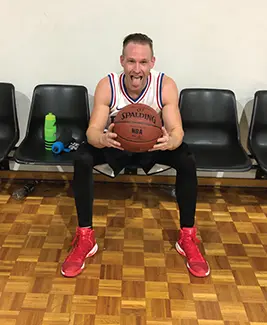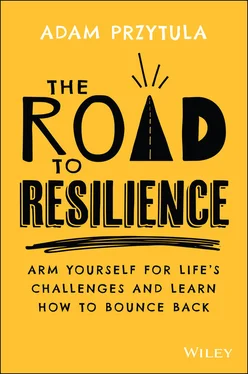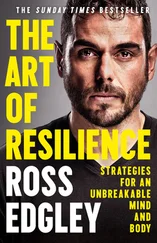After our next game, I approached a guy on our team who was an incredible player.
‘I'm thinking about stepping off the team,’ I confessed.
‘Nah, man, don't do that,’ he said. ‘We need you. Every time you step off the court our lead decreases because your rebounding and your defence are so strong.’
During the next match, I took more notice of how I contributed to the team, and I saw he was right. My job wasn't to take possession and score. I was a defender. That's right: I wasn't MJ (Michael Jordan), I was Dennis Rodman. Basketball teams need both types of players.
If I hadn't called myself out though, I would have gone into the next game acting like ‘That Guy’. I would have been thinking, No‐one wants to pass me the ball . This ANT would have affected my confidence and my game. Then my teammates really might not want to pass me the ball, and I'd risk really becoming ‘That Guy’. But I became aware of the ANT and I squashed it. By fact‐checking with another player and weighing up the evidence, I realised what I'd assumed wasn't true. I replaced my ANT with a positive thought — I'm a good defender — and it boosted my self‐esteem.
Two weeks later I severed my ACL (a ligament in my knee). It took me 12 months to get back on the court. Two weeks after I did my ACL, my basketball team lost their first match in two years. This reinforced to me that I wasn't the guy no‐one wanted to pass the ball to. My role on the team wasn't to score points, but that didn't mean I wasn't a valuable team member. From that point on, I had the conviction — and the repeated positive thought — that my team needed me to be able to function well.
Here is a photo of me excited about my first basketball match after tearing my ACL.

When I returned to basketball after recovering from my injury, I had to join a new team because my old team had fallen apart. We were winning three seasons in, and I started playing attack instead of defence. I was regularly scoring 20 to 25 points each game. I put this down to having improved my thinking around basketball, and actively working on raising my self‐esteem.
You too can ward off those ANTs by choosing to be aware of your thoughts and identifying whether or not they're true.
Try this
Nip your ANTs in the bud
For the rest of today and tomorrow, I want you to try and catch any Automatic Negative Thoughts (ANTs) you experience. Pay attention to how you're feeling, and if you start to feel down or discouraged out of nowhere, identify the ANT causing it.
If you're not sure whether your ANT is a true fact or not, check with someone. Don't ask your mum if you're beautiful/good looking though because, of course, she's going to say yes (unless you have a very real and honest relationship with her). Ask a trusted, but neutral, adult: a teacher, an adult you look up to and see as a mentor. This might be your auntie/uncle or a next‐door neighbour.
Don't jump on ASKfm or any of your socials. Just don't.
Self‐awareness is about understanding your needs, desires, failings, habits and what makes you tick. If you take the opportunity to learn about yourself, it will be easier to deal with life's challenges.
A big part of self‐awareness is understanding your emotions. As I mentioned before, it's okay to feel . Your emotions are valid. You will have feelings about yourself that are unpleasant. Sometimes these feelings stem from ANTs. Sometimes they occur because of something someone says about you, or something that happens to you.
It's normal to want to push down or ignore nasty feelings. Have you ever had a rush of anger or despair so strong that it feels like you can't cope? This happens because negative feelings build up inside us like a pressure chamber until, eventually, we can't contain them anymore and we either explode or experience a meltdown.
Being self‐aware means that instead of trying to hide your feelings, or push them away, you choose to pay attention to the emotion and what it's trying to tell you.
When I was a teenager, I didn't know what self‐awareness was. By Year 8, my self‐esteem had spiralled downwards. I blamed my problems on other people: my parents for splitting up; most of the kids at school for bullying me. My ANTs were getting worse. Everyone hates me , I thought. I don’t have any friends. I’m ugly and I’m fat . The ANTs were making me feel depressed and anxious. Things were getting worse by the day.
During this time, there was one person in my life who I knew truly cared about me: my grandmother, whom I called ‘Oma’ because she was German. Oma and my grandfather (Opa) had fled Europe after World War II because he was Polish and their relationship was frowned upon at the time, if not yet downright verboten. Oma was a nurse, both during the war and when she and Opa moved to Australia. Oma was known for her caring nature. All of the kids on Oma's street used to visit Oma with scraped knees, insect bites and various other injuries. As he became older, Opa developed Parkinson's disease and Oma became his full‐time carer. I don't have a lot of memories of Opa as he tended to keep to himself, but Oma had a huge influence on my life.

Here is a photo of Oma as a young woman living in Germany.
When Mum and Dad split up, Mum moved out and Dad started working really long hours. He would be gone from 6 o'clock in the morning until at least 7 o'clock in the evening. Sometimes he wouldn't come home until close to midnight. Not long after, my brother moved out. I was on my own a lot. Time felt like a gaping hole and the hours seemed to stretch endlessly before me. I actually missed the noise of Mum and Dad yelling and arguing with each other.
Every morning, Oma would drive to my house to make sure that I got out of bed, ate breakfast and went to school. This was no easy feat for Oma. I'd wake up each day filled with a sense of dread. I knew I was going to get bullied, but I didn't know when it was going to happen. When I arrived home from school, Oma was always there, cleaning and cooking. Oma's presence was comforting. I soaked up the unconditional love and attention she offered me. At the same time, I dreaded the moment she'd need to leave to go and take care of Opa. Each evening, 6 o'clock rolled around and Oma's car would drive away. An overwhelming sense of despair would surge within me. The hours stretched endlessly before me. There was no relief in sight.
At the time, I didn't understand what was happening to me. I knew I was feeling depressed and anxious, but I tried to push these feelings down and ignore them. The only thing that got me through each day was the sense of comfort and unconditional love that Oma gave me. But my emotional state continued to plummet. I hated myself. My grades began to suffer. I started turning to behaviours that I thought were helping, but that were actually only making things worse.
When we're feeling stressed, or experiencing negative feelings, it's normal to turn to the things that help us cope. These are known as ‘coping mechanisms’. Not all coping mechanisms are created equal. For example, going for a run might help someone cope with feelings of stress or anxiety. Another person might turn to alcohol to help them cope with their emotions. A coping mechanism may be considered healthy or unhealthy. A ‘healthy’ behaviour might be considered ‘unhealthy’ in large quantities, and vice versa. We'll look at this further in chapter 4.
Читать дальше














